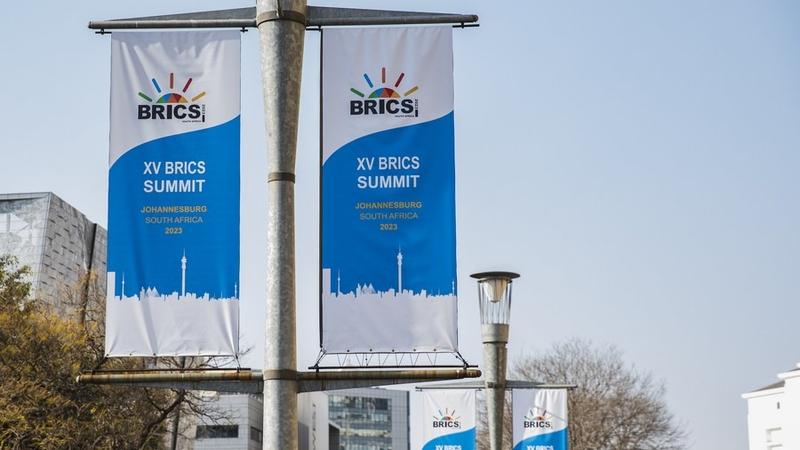Region showing interest in membership, which experts say could boost position, economy
 This photo taken on Aug 21, 2023 shows a view near the venue of the 15th BRICS Summit in Johannesburg, South Africa. (PHOTO / XINHUA)
This photo taken on Aug 21, 2023 shows a view near the venue of the 15th BRICS Summit in Johannesburg, South Africa. (PHOTO / XINHUA)
Asian nations, especially Arab countries, have shown growing interest in joining the BRICS group of fast-developing economies as membership could open up new opportunities for them and other nations underrepresented in the “Western-centric” global governance structure, analysts said.
They added that aside from economic gains, BRICS membership could also be a platform for Arab countries to create an identity beyond regional boundaries.
Raissa Sare, a fellow at the Asia Middle East Center for Research and Dialogue (AMEC), told China Daily that joining BRICS could open doors for countries that remain underrepresented in the global governance structure, offering them a chance to improve their position and influence.
The grouping “is anchored in fostering cooperation, development and pushing for the restructuring of the global governance mechanisms to ensure a more equitable distribution of power in a still very Western-centric international structure”, said Sare, who is based in Sao Paulo, Brazil.
“It is interesting to analyze how BRICS has gained traction, despite its ups and downs throughout the years. The high interest from developing economies in the Middle East and Africa is just an example,” he added.
BRICS is a grouping of emerging economies comprising Brazil, Russia, India, China, and South Africa. Founded as BRIC in June 2009, South Africa officially became a member of the group in 2011.
The 15th BRICS Summit was held in Johannesburg, South Africa, from Aug 22 to 24.
In the run-up to the summit, South African Minister of International Relations and Cooperation Naledi Pandor said a total of 23 countries have officially applied to join BRICS, including several Arab countries as well as Indonesia, Iran and Bangladesh. The group’s plan for expansion was among the topics on the agenda to be discussed in Johannesburg.
Jawaid Iqbal, chairman of the Department of West Asian and North African Studies at Aligarh Muslim University in India, told China Daily that growing moves toward multipolarity have breathed new life into BRICS, as seen in critical global transformations.
“The emerging scenario of a new Cold War involving China, the sweeping US sanctions on Russia after the Ukraine conflict, India and South Africa’s stance of non-alignment, and the re-election of Brazil’s left-wing leader, President Lula (Luiz Inacio Lula da Silva), in 2022, have collectively etched fresh fault lines within global politics,” Iqbal said.
“These elements synergistically underscore BRICS’ renewed significance in adeptly navigating the evolving global arena,” he added.
Iqbal said the calls for inclusion from the Arab countries “stem from the waning political influence held by the Global North”, which faces mounting resistance against its persistent efforts to uphold the imperialistic world order. The economic prowess of BRICS offers an avenue for channeling this dissent, he said.
“Notably, in 2020, the combined GDP of BRICS nations, assessed through purchasing power parity, surpassed that of the G7, amounting to 31.5 percent versus 30.7 percent. This trajectory is expected to expand further,” Iqbal said.
“In the face of the Northern nations’ increasingly desperate maneuvers to preserve their monopolistic dominion, the appeal of BRICS is poised to intensify,” he added.
Algeria, Bahrain, Egypt, Kuwait, Morocco, Palestine, Saudi Arabia, and the United Arab Emirates are among the Arab countries that have applied to join BRICS, according to a report by the Middle East Monitor.
However, Moroccan News Agency MAP reported that Morocco had not applied to join BRICS and would not attend the summit, citing an unnamed source at the Moroccan Foreign Ministry
Sare from AMEC said the potential economic gains for new members “cannot be dismissed”, as being part of BRICS can give countries access to investment to boost their economies. The bloc of developing nations now accounts for about a quarter of global wealth.
“However, when considering other main benefits for Arab countries, we must look beyond fostering investments or catalyzing trade relations with economic powerhouses such as China and India. BRICS can also enable these countries to interact more actively in the international system and create an identity beyond their regional boundaries,” Sare said.
According to the Silk Road Briefing news monitoring site, BRICS is expected to contribute over 50 percent of global GDP by 2030, noting that China’s GDP had overtaken that of the United States in 2015 when comparing economies in terms of purchasing power parity.


